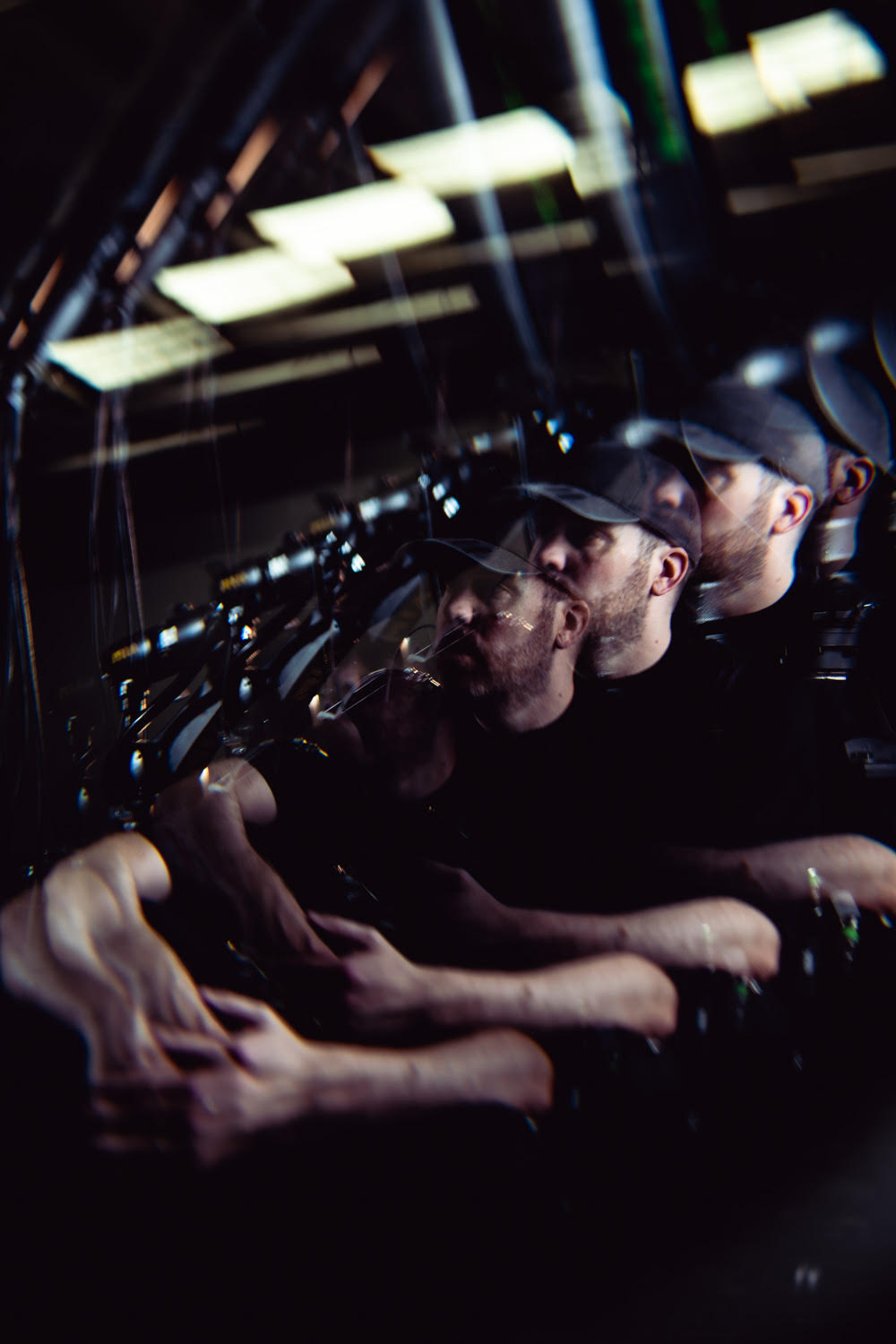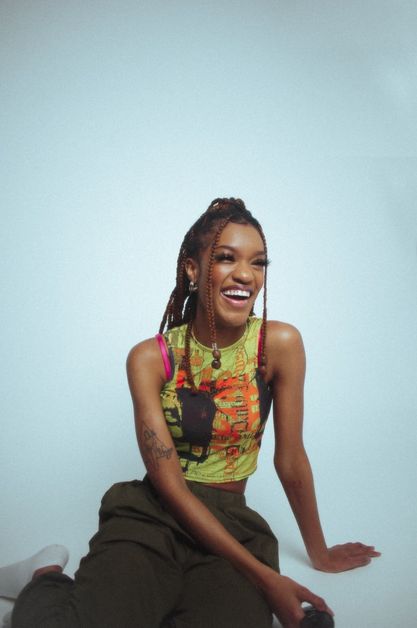Last time Eprom spoke with UKF he debuted his SHADES album, a project with Alix Perez, but now, after ten years, he’s going solo again. His Syntheism LP was released on the 9th of June. On this album he’s choosing a more experimental approach, and he worked on a full visual live show accompanying the LP.
Want to know what to expect from the album? A blend of electronica, dubstep, halftime, drum & bass, techno, acid house, and hip-hop. As a real innovator, Eprom experiments with all kinds of techniques, palettes, and aesthetics, and this has translated well on Syntheism. The album gives you a look into a utopian world, reimagining the rave scene as we know it today. We talked with the artist and talked about the album, his creative process, and the story behind it.
First things first, congratulations on your release! It’s your first album in 10 years, so it must feel special.
Thank you. Yes, my first two albums back in 2012 and 2013 came quickly because at the time I had an idea of where I wanted to go, I wanted to transcend various genre conventions. After those two I kind of made a third album around 2013-2014, but I ended up scrapping it because I didn’t think it was good enough. I am a perfectionist about that stuff. After that scrapped album my ideas ended up becoming a series of EPs over the next couple of years. I feel like with EPs, there is less pressure of having a cohesive hour long listening experience, it can be a specific statement, intent or aesthetic that you can get out in 20 minutes. And as well, I was touring all the time, so i didn’t have the time to sit down and write a whole album.
This album came about because I had so much free time during lockdown. It also changed my perspective on what’s important musically. It gave me all this time and space in the studio, I didn’t have to chase club music or anything that would work well on the dancefloor, I could just experiment. That was very liberating for me. It’s been a long time coming to actually get it out because we put so much effort and energy into the visual component. We’ve been developing the world in which this album lives over the last two years.
You said that lockdown changed your vision on music. How so?
Eprom: This album is kind of a reinvention, because it is very utopian. I was reading an old interview earlier and I described my sound as dystopian and I was like “You know what? It’s 2020, the world is going to shit and there is enough dystopia in the news already. I might as well present a way forward or a utopian vision”. And that is what this album is about. It’s a utopian vision on how we can reimagine raving and clubbing.
When listening to the album, people can hear a lot of different genres…
I love all those sounds and I try not to be tied down to one particular genre. I try to put my personality into anything I’m making. A lot of this album is a return to my influences, growing up in the 90s and 00s, the rave music that was happening at the time and how transgressive and disruptive it could be. I’m trying to capture that and put my own sound into it. When I started the album I was really influenced by Telefon Tel Aviv and his side project Second Woman. In this project he would use Max/MSP to create an undulating rhythmic grid which ebbed and flowed when the tempo changed. So it was programmed but generative at the same time. That was really interesting to me and I thought “How can I engage in a conversation in that approach by bringing it into a more rhythmically structured dancefloor kind of world?”.
Songs like ‘Motion Blur’ on the album are me trying to encapsulate that approach and trying to make it function in a dancefloor context. I’m constantly taking the most experimental sounds possible and making them into dance music. The question there is “How far can I push it?”.
Can you tell us a bit more about the creative process behind the album?
Like I was saying, I was really inspired by Telefon Tel Aviv. He did some interviews where he talked about his approach to rhythm. I recontextualised old rave sounds, like amen breaks, rave stabs, and stuff like that. I made five or six tunes in that vein.
I knew I wanted to have an intro. I went to school for film, so that’s a huge influence for me, I wanted to make a sonic introduction into the album. ‘A New Home’ is basically a string of corporate logo sound drops. It was an experiment for me, to see if I could do it, it’s also a way of bringing people into the world that we created. We, as in Jackson Green and me, we came up with the visual world for this album to live in. It became a Science Fiction kind of alternative reality, based on the Akkadian empire of 6000 BC, as if that was the dominant seat of power in the world. So basically we asked ourselves “What if the Akkadian empire had been the locus of power instead of the Roman empire, what would that have looked like? Where would we be?” We created this utopian future positive world with a different aesthetic from our present reality.
Sonically I wanted to create this utopian vision that incorporates rave sounds and corporate sounds, and put everything in a blender. We retroactively came up with this world where all of these sounds could fit together and it gave us backbone for the visuals, for the whole liveset, and for the album covers.
Where do you find your inspiration?
I started producing when I was really young and I started to get inspired by the drum & bass that was happening at the time. The genre is so technically demanding, it has to be very loud and crunchy and aggressive, that it gives you a certain leg up on production if you can make a D&B song that sounds good. I have an experimental approach where I find a new tool, and in the process of figuring it out, is the phase where I get the most out of, so I get the most out of the experimental stage, not being completely technically proficient yet. It’s also the moment when you find the most interesting things, because you are discovering how the tool works, and that moment makes for the most critical sounds.
So I’m basically always looking for new tools, there are tons of different techniques on the album. I tend to try one sound and then get bored and try new sounds, samples, new processes. Learning Max/MSP was also a big part of the process. It’s the part where I discover new things, and reinvent myself by doing what I normally do but with completely new tools, that’s very interesting to me.
In those 10 years between your last and current album, you had a lot of time to experiment with different sounds, like SHADES, working with G Jones etc. How did you find your style?
SHADES took a lot of time and energy. And at some point there was a dimension where the Eprom sound came out there. In those 10 years we made two SHADES albums and I also released several Eprom EPs. But after some time I felt like it was time to really focus on delivering a coherent hour-long message of where I was musically. Lockdown gave me the time to do that.
It’s really hard to put out albums in this day and age, because people barely have the attention span to listen to one track front to back anymore. TikTok and Spotify have changed the listening experience a lot, so albums are becoming more rare, but I love albums, I love listening to them. I’m a big proponent of active listening, giving something your full attention. I hope that people can find the time to do that with the album, I promise you that it’s rewarding.
You ended up choosing ‘The Circle’, ‘Untitled Emotional Acid’ and ‘What’s Her Name’ as singles. Why those three tracks?
I originally was going to make ‘Motion Blur’ into a single, but I ended up making ‘What’s Her Name’ later in the album cycle. It’s one of the more poppy songs on the album and I thought it was a single when I made it, it’s just three minutes of “in your face” music. I feel like all three tracks represent different aspects of what the album is about.
Earlier you said that you’ve been working on a live show accompanying this album. What can we expect from that?
It was a really long process. We started having conversations with a company in Portland, Motorized Precision. They have really nice high tech robots, used for shooting slow motion shots for businesses. We pitched them on an idea of doing a lives how, and after that we put it together in Portland. In six months we put the music and visuals together, and programmed the robots. It all came together this year, I’m really stoked on that.
It’s me trying to present a new narrative for a live show. It’s not a DJ show as I’m making an effort to separate the DJ component from the live component. It’s all new music, and it’s hardware and software, and the robots are fully synchronized for the full 90 minutes. The live show is still rave music, but sometimes it goes to silence and it can be more experienced like a concert, it’s a more diverse sound palette rather than a DJ set where everything is about keeping the energy really high all the time. There’s more freedom to explore passages that are purely about texture, or a mood, or an ambient vibe. A DJ set is pretty intense, that’s a vault set. What my plan is now is doing a live Syntheism set and a DJ set in the same city at the same weekend as much as possible, so people can get a little bit of both.
I hope I can bring the Syntheism tour to more places, but for now we’ve got one show planned in Denver at the end of July. Who knows, maybe I’ll take it to Europe, but then it will probably be a more simple version of the robots as it’s really hard to transport them.
Follow EPROM: Spotify/Instagram/Soundcloud


